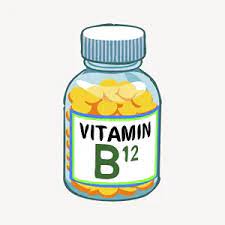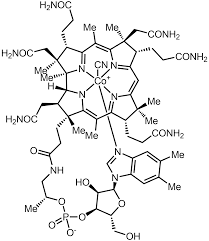Video Link: https://vimeo.com/184565111
Video Download: Vitamin B2 Riboflavin Benefits And Side Effects
Video Stream: Vitamin B2 Riboflavin Benefits And Side Effects
Vitamin B2: Riboflavin Benefits and Side Effects
by Don V. Richards
Vitamin B2 - also called "riboflavin" after "ribose," the sugar which forms part of its chemical makeup, and "flavus," for its typical yellow color - is a water-soluble vitamin necessary for human metabolic processes in the body, including cell function, growth, and the production of energy. Vitamin B2 is needed for the formation of every single one of our red blood cells and antibodies.
Riboflavin is essential for assuring proper growth and development of our reproductive systems and for the necessary growth of all our body tissues  such as skin, ligaments, eyes, nasal passages, nerves, and our all-important immune system.
such as skin, ligaments, eyes, nasal passages, nerves, and our all-important immune system.
Riboflavin also helps produce healthy skin, nails, and hair and aids in regulating thyroid activity (which controls how rapidly the body uses food energy and is a significant factor in how energetic you feel).
Riboflavin helps absorb minerals like iron and folic acid and helps the body absorb other Vitamins like B1, B3, B6, and others. Riboflavin also helps to enhance our body's natural immune system by increasing our reserves of antibodies.
The bright orangish-yellow color of riboflavin is what imparts that shade to most B complex and multivitamin supplements, and in fact, Vitamin B2 is registered in Europe for use specifically as a safe food coloring agent! Interestingly, because riboflavin fluoresces under ultraviolet light, it has often been used to detect leaks or demonstrate liquid delivery system coverage in industrial applications.
A recent development is the use of Vitamin B2 for the 3-D printing of replacement body parts or microneedles used for painless cell-level injections. Formerly, there were side effects from the substances typically used in 3-D printing, but riboflavin is essentially non-toxic and promises to significantly advance progress in this field.
All the B vitamins - often referred to as the "B complex" of nutrients or vitamins - help the body metabolize protein and fat. They convert carbohydrates - food - into glucose - fuel - for our cells and are essential for life.
Riboflavin is necessary for the normal development and function of many bodily organs, especially the skin, the linings of the stomach and intestines, and blood cells.
According to the University of Maryland Medical Center, Riboflavin also has an
"antioxidant" effect. Oxidants are harmful particles in the body, sometimes called "free radicals." These particles cause damage to cells over time and are strongly implicated as one of the major factors in the degeneration of formerly healthy tissue and in the aging process itself.
Free radicals can even damage DNA; when they do, cells reproduce defectively, which can sometimes lead to cancer.
As an antioxidant, Vitamin B2 is thought to help preserve youthful good health, both by itself and in synergy with other antioxidants and nutrients.
Since it's water-soluble, it's not stored in body fats like other nutrients, and excess amounts are flushed into the urine. So, to maintain health, we need a sufficient supply of riboflavin and a regular supply.
Trace amounts of riboflavin are found in the tissues of most animals and plants, so eating a natural, healthy diet usually gives us the necessary amount of B2 without supplementation.
Excellent riboflavin sources include milk (and dairy products generally), eggs, green vegetables (notably asparagus and broccoli), almonds, mushrooms,  soybeans, yogurt, cereals, and grains enriched with Vitamin B2, asparagus, popcorn, bananas, and most animal-based foods.
soybeans, yogurt, cereals, and grains enriched with Vitamin B2, asparagus, popcorn, bananas, and most animal-based foods.
Vegans and vegetarians especially should take care to get enough of this vital nutrient. Yeast extract is particularly rich in B2.
Riboflavin deficiency is called "ariboflavinosis" - naturally, adding Vitamin B2 in such cases is called for.
Some symptoms of ariboflavinosis are anemia (low red blood cell count), weakness, dandruff, fatigue, dizziness, hair loss, loss of sleep, poor digestion, slowed mental response, swelling of the throat or tongue, sensitivity to light, skin irritation, and skin cracking or soreness at the edges of the lips.
Though the full-blown deficiency is rare, it is sometimes seen among those with very poor diets, severe or chronic diseases, alcoholics, the poor, and the elderly. Though often associated with the very poor diets of Third World countries, it is estimated that some 28 million Americans suffer from "sub-clinical" near-deficiency conditions.
For those who are anemic, it is often found that their riboflavin levels are also low, and the effectiveness of the iron therapy usually used in such cases is increased by restoring normal riboflavin levels via supplementation or diet changes.
Riboflavin supplementation and light exposure (phototherapy) has been helpful for infants with neonatal jaundice.
In a preliminary study of 31 patients afflicted with Parkinsons' disease, every single individual showed, when tested, evidence of Vitamin B2 deficiency. All patients who were given 30 mg of riboflavin thrice daily for six months showed definite improvements in motor skills and strength.
The improvements were evident at three months and were maintained or even improved further at the end of the six-month period. (One flaw in this study is that all participants stopped eating red meat during the trial, and it is unknown if this was a synergistic factor in combination with the Vitamin B2 supplementation.)
Some studies suggest that Vitamin B2 can have a positive role in treating and preventing cataracts, and research is ongoing in this area.
Among patients treated with tricyclic antidepressants, it's been found that boosting Vitamin B2 levels improve their cognitive function and depression scores.
Its thought that the antidepressants themselves may partially suppress normal riboflavin levels, making supplementation a good idea. Some nutritionists believe that Vitamin B2 by itself can help prevent depression.
Among those suffering from anorexia or bulimia, it's often noted that their blood levels of vital nutrients are low - and nearly a third are deficient in Vitamin B2. While dietary changes are obviously called for in such situations, supplementation can have a role while a healthy eating program is instituted.
New research also suggests Vitamin B2 in high doses may help prevent migraine headaches. According to these studies, taking 400 mg per day of riboflavin reduced the number of migraine attacks, though it didn't reduce the perceived pain they caused when they did occur.
In high doses, Vitamin B2 can cause an increase in urine flow and will color the urine orange. It can also cause diarrhea. But it is considered otherwise safe. The body will regulate riboflavin levels itself with no ill effects. In the recommended dietary allowance range of 1.4 to 1.6 mg per day, it is also considered safe for pregnant and breastfeeding women - larger doses may be safe, too, but not enough studies have been done to allow certainty, so be careful.
The amount of Vitamin B2 you need will vary depending on your personal health and the conditions you may be suffering. For most people, eating a healthy, natural diet rich in green vegetables will provide all the riboflavin you need for everyday health.
Sufferers from migraine headaches typically take a daily dose of 400 mg of Vitamin B2 over a period of several months.
If you're dealing with low levels of riboflavin in your blood (Vitamin B2 deficiency), adults typically supplement with 5 to 30 mg daily, separated into several doses.
Those who are following the program for preventing cataracts suggested by some studies take 2.6 mg of riboflavin daily, some along with 40 mg of niacin too.
The official adult recommended dietary allowance (RDA) for Vitamin B2 (daily figures) is 1.1 mg for non-pregnant or breastfeeding women and 1.3 mg for men.
These values are closely tied to energy expenditure - so those who are highly active may need more than these allowances for normal functioning.
Interestingly, the RDA for Vitamin B2 in Russia is approximately twice the US level - but that's still comparatively low. Nevertheless, about 71 percent of Americans would fall below adequate B2 levels if judged by the Russian RDA.
If you use supplements to achieve the optimal levels of riboflavin, remember that increasing your intake of just one of the B complex vitamins can lead to an imbalance.
As long as all safe dosage levels are maintained, it's usually better to take a B complex supplement which maintains the natural balance between these beneficial nutrients. Its also thought that they have a synergistic effect when taken together - that is, the benefits of the entire complex are greater than the sum of those of the individual vitamins.
The scientists at the Life Extension Foundation believe that higher than maintenance doses will have a beneficial effect, and they include 50 mg of Vitamin B2 in their daily "Life Extension Mix" vitamin and nutrient recommendations - almost 3,000 percent greater than the RDA (though still well under the doses routinely used by migraine patients).
Many commonly available supplements provide around half this level - 20 to 25 mg, still far above the RDA.
Riboflavin is not at all toxic when ingested by mouth, though it is possible to achieve toxic doses via injection. Even those given 400 mg daily in the migraine study - far beyond the putative life extension dose - exhibited no short-term side effects.
When considering supplements, consider ones made with natural instead of synthetic Vitamin B2.
Synthetic riboflavin is supposed to be virtually identical to the natural variety, but some synthetic varieties are produced through the fermentation of  genetically modified bacteria, and many health-conscious people are trying to eliminate GMOs (genetically modified organisms) from their diets because we just don't know their long-term effects on living things yet.
genetically modified bacteria, and many health-conscious people are trying to eliminate GMOs (genetically modified organisms) from their diets because we just don't know their long-term effects on living things yet.
Synthetics can usually be identified by having the letters dl- in front of the nutrients name on the ingredients list or by having substances ending in -ide, -acid, or -ate as additional ingredients (these are salts or other additives used to make the synthetic forms last longer). Natural-source vitamins also contain trace elements that our bodies have evolved over millennia to ingest along with the foods we eat.
Whatever level and source of Vitamin B2 you choose, remember that our purpose here is to help you make an informed choice - and take charge of your health yourself instead of leaving it in the hands of others.
Our diets may be poorer than ever in general today, but it's also true that access to the latest research and facts about nutrition and health has never been easier than it is today. Take advantage of the information revolution, use your own reasoning and judgment - and change your life for the better today!
REFERENCES
Keligman, Nelson, Textbook of Pediatrics, 18th ed. Philadelphia, PA: Saunders Elsevier, 2007
Kuzniarz, M., Mitchell, P., et al: "Use of vitamin supplements and cataracts: the Blue Mountains Eye Study," American Journal of Ophthalmology, 2001;132(1):19-26
MacLennan, S.C., Wade, F.M., et al, "High-dose riboflavin for migraine prophylaxis in children: a double-blind, randomized, placebo-controlled trial," Journal of Child Neurology, 2008 Nov; 23(11):1300-4
University of Michigan Health System, "Vitamin B2," http://www.uofmhealth.org/health-library/hn-2925007 , accessed May 13, 2014
Organic Facts, "Health Benefits of Vitamin B2," http://www.organicfacts.net/health-benefits/vitamins/health-benefits-of-vitamin-b2-or-riboflavin.html , accessed May 13, 2014
Colorado State University, "Water-Soluble Vitamins," http://www.ext.colostate.edu/pubs/foodnut/09312.html , accessed May 14, 2014
The Institute for Optimum Nutrition, "The Vitamin Controversy," http://www.ion.ac.uk/information/onarchives/vitamincontroversy , accessed May 14, 2014
Charles Pulsipher, "Natural vs. Synthetic Vitamins: Whats the Big Difference?", Raw Vegan Superfoods and Supplements, http://www.sunwarrior.com/news/natural-vs-synthetic-vitamins/ , accessed May 14, 2014
Healthline, "Riboflavin," http://www.healthline.com/natstandardcontent/riboflavin , accessed May 14, 2014
University of Maryland Medical Center, "Riboflavin," http://umm.edu/health/medical/altmed/supplement/vitamin-b2-riboflavin , accessed May 12, 2014
SpectraCell Laboratories, "Vitamin B2: Is it Important?", http://info.spectracell.com/bid/94485/Is-vitamin-B2-Riboflavin-important-YES , accessed May 12, 2014
Shaunacy Ferro, Popular Science, "Vitamin B2 Can Be Used To 3-D Print Medical Implants," http://www.popsci.com/article/science/vitamin-b2-can-be-used-3-d-print-medical-implants, accessed May 12, 2014
GMO Compass, "Vitamins," http://www.gmo-compass.org/eng/database/ingredients/204.vitamins.html , accessed May 12, 2014
- Vitamin E and HGH [Last Updated On: February 14th, 2023] [Originally Added On: May 9th, 2022]
Word Count: 1967







